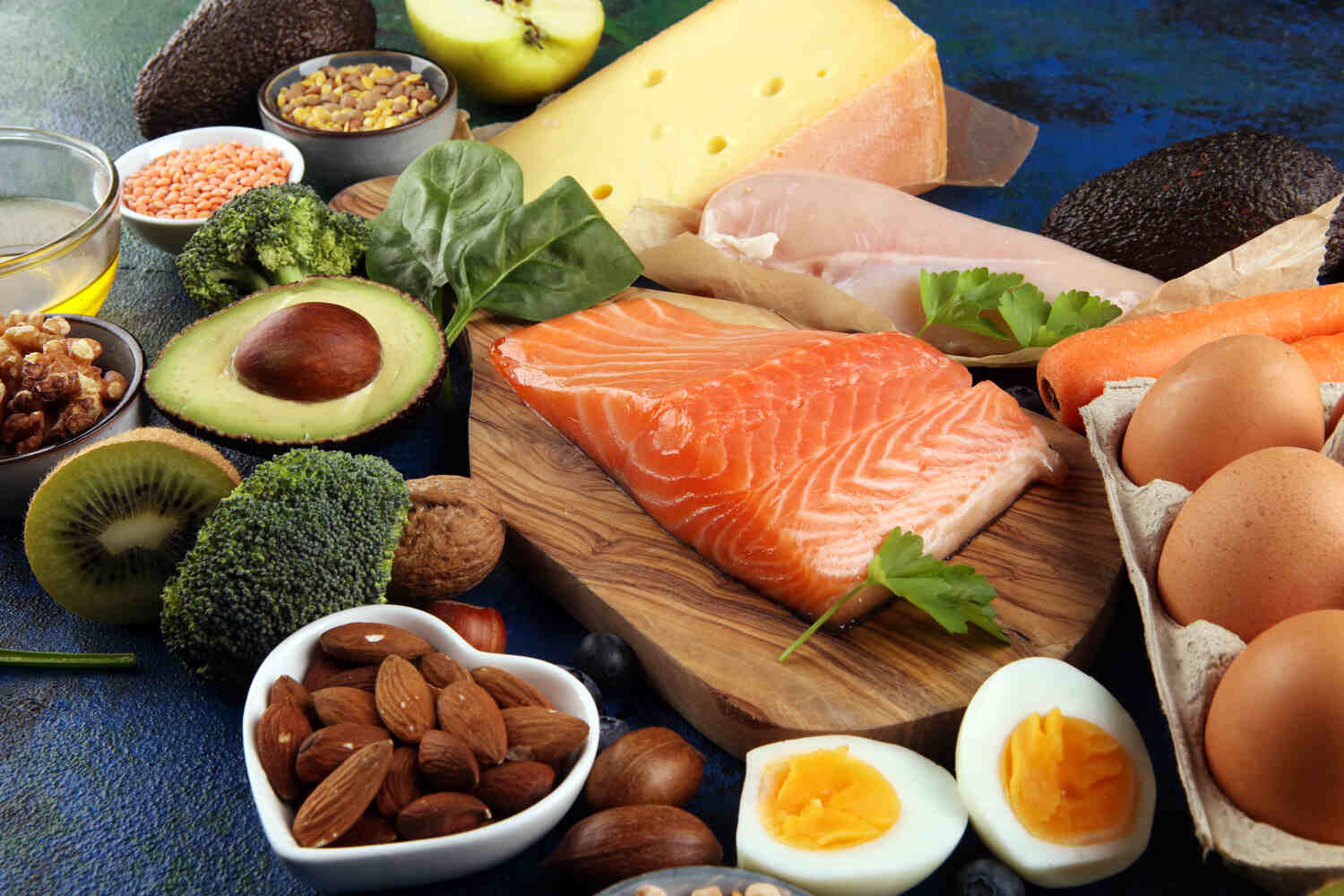 The phase of the second trimester during pregnancy is a crucial period as the growing baby undergoes significant and magnificent changes. Its body structure almost develops; the organs are almost active and working. Moreover, it is at this stage onwards to prioritize strength by means of good nutrition and physical activity as suggested. Being an expectant mother, both your doctor and dietitian will recommend improving your diet by increasing intake of calcium, protein, Omega-3 Fatty Acids and Vitamin D.
The phase of the second trimester during pregnancy is a crucial period as the growing baby undergoes significant and magnificent changes. Its body structure almost develops; the organs are almost active and working. Moreover, it is at this stage onwards to prioritize strength by means of good nutrition and physical activity as suggested. Being an expectant mother, both your doctor and dietitian will recommend improving your diet by increasing intake of calcium, protein, Omega-3 Fatty Acids and Vitamin D.
By the time the 4th month enters, you will almost be free from morning sickness. So, it is obvious that you would love to enjoy your missed favorite dishes. However, it is equally important to know and understand what foods to exclude and should include to lead a healthy and safe pregnancy.
In This Article
- The Fourth Month Of Pregnancy
- 6 Nutients To Include In Fourth-Month Pregnancy Diet
- Foods To Include In Fourth-Month Pregnancy Diet
- Foods To Avoid In The Fourth-Month Pregnancy Diet
- FAQ’s
The Fourth Month Of Pregnancy
The onset of Fourth month of pregnancy signifies the beginning of the second trimester. During this time, several changes are expected to both the mother and growing baby. Fetal length increases to about 7.5 cm, weight increases by 30 g per week. The danger of miscarriage, furthermore, has now dropped, which lessen the anxiety of the mother to an extent. Among the three trimesters, the second trimester is regarded as the safest travel. The gyneacologist will recommend your first ultrasound scan and several tests during this month. If you have developed some dental issues during the last trimester, this is the best time to seek the treatment.
6 Nutients To Include In Fourth-Month Pregnancy Diet
 The journey of pregnancy embarks nourishment for you and your growing baby. During this pivotal phase, it is important to choose smart food sources to get nutrients in a balanced manner. Let’s delve into this in detail to ensure support and development.
The journey of pregnancy embarks nourishment for you and your growing baby. During this pivotal phase, it is important to choose smart food sources to get nutrients in a balanced manner. Let’s delve into this in detail to ensure support and development.
Iron
As the blood volume increases significantly during this month, intake of iron-rich food is important to meet the greater level of iron requirement. As per Recommended Dietary Allowances for Indians, the recommended intake is 30mg. Intake of iron rich foods will help to increase red cell mass and supports fetal development (1).
Vitamin C
Regular intake of Vitamin C from food sources such as citrus fruits and vegetables helps to build collagen and other maternal tissues. Intake of Vitamin C is necessary, as it increases the absorption of iron by the body as well as prevents dental problems like gingivitis (2) and scurvy.
Fiber rich Food
Including fiber rich food in the daily menu gives opportunity to cut down the constipation and hemorrhoids during pregnancy. Dietary fiber should be initiated gradually and start with soluble fiber to avoid bloating and flatulence. With this, moderate exercises are recommended for pregnant women under supervision. (3)
Essential Fatty Acids
 Essential fatty acids are essential for the development and improvement of the child’s central nervous system, specifically brain and retina. They play a very important role in overcoming perinatal depression (4). Make sure that your pregnancy menu provides adequate measures of Omega 3, 6, 9 fatty acids (5).
Essential fatty acids are essential for the development and improvement of the child’s central nervous system, specifically brain and retina. They play a very important role in overcoming perinatal depression (4). Make sure that your pregnancy menu provides adequate measures of Omega 3, 6, 9 fatty acids (5).
Calcium
As the calcification of the bones of the baby is progressing your body needs to increase the intake of the calcium to avoid the baby absorbing calcium from your calcium reservoirs and leaving you at the risk of osteoporosis in the future (6). Not just this, the optimum intake of around 1200 mg per day through dairy products and leafy greens, it prevents pre-eclampsia, gestational hypertension or even preterm birth
Protein
Amino acids are essential for the development of body cells. Amino acids are derived from protein, which is consumed by the mother. Hence, protein intake is important during the fourth month of pregnancy (7)
Foods To Include In Fourth-Month Pregnancy Diet
 Including the following food items in the daily menu will help you to ensure the healthy development of the baby. Using olive oil for dressing and cooking will help in meeting the requirement of essential fatty acids:
Including the following food items in the daily menu will help you to ensure the healthy development of the baby. Using olive oil for dressing and cooking will help in meeting the requirement of essential fatty acids:
Whole grain Food items
Whole grain foods are food made from food grains that have the barn, endosperm, and the germ. They help to meet the increased requirement of energy. It is also a good source of fiber, iron, and vitamin B. Whole-wheat breakfast cereals, whole wheat bread, pasta, brown rice, bulgur, etc. and any product that marked ‘100% whole grain’ can be included. What you need to understand is that multi-grains are not whole grain (8).
Beans and Lentils
The protein, iron, folate, and fiber content of beans and lentils are optimum enough to reduce the spinal cord defects and birth defects. The phytonutrients present lowers the risk of comorbidities in both mother and growing baby by strengthening immunity and promotes good skin.
Dairy Products
The calcium-rich dairy product should be an important part of the daily menu during the fourth month of pregnancy. The minerals present maintain the overall homeostasis (9) and prevent Vitamin B12 deficiency disorder. Make sure you are having at least one liter of milk/milk products per day
Fish
Fish is rich in omega 3 fatty acids, proteins, and vitamin D. It also provides DHA help with the brain development of the baby. Including properly cooked fishes that are low in mercury level are safe to consume during pregnancy (10).
Meats and Chicken
Meat and chicken (well cooked) are rich in protein, iron, Vitamin B3 and selenium vital for preventing miscarriage and stillbirths while stimulating fetal brain development. They are also responsible for producing hormones and enzymes required during gestation.
Vegetables
Cauliflower, broccoli, carrots, leafy vegetables, turnips, etc., provide all the essential minerals and vitamins you need during this month. These vegetables increase gut microbiome diversity and birth weight. It also helps in overcoming postpartum and childhood obesity.
Fruits
Fresh fruits are an unquestionable requirement all through pregnancy as they have heaps of vitamins and minerals; besides, they are high in water and fiber content. The fourth month of pregnancy can set off acidity and heartburn. Thus, fruits ought to be a vital part of your fourth -month pregnancy menu.Apple, banana, orange, apricot, grapes are loaded with minerals and vitamins that are essential during this period of gestation.
Eggs
Eggs are rich in proteins as they contain all nine essential amino acids that significantly improves birth outcomes. It has choline and essential fatty acids which promote brain health of the fetus. For mothers, inclusion of eggs helps in biosynthesis of placental hormones (11).
Nuts and Dried Fruits
Nuts like walnuts, almonds, peanuts, pistachio are a good source of essential fatty acid, dietary fiber, calcium, iron and a wide range of essential nutrients. Dried fruits like dried fig, dates, and raisins are abundant in iron, fiber, calcium, and other vitamins and minerals. Therefore, intake of a hand full of assorted nuts and dried fruits per day can do wonders during this time of gestation.
Foods To Avoid In The Fourth-Month Pregnancy Diet
 The crucial first trimester is finished and now you look forward to your growing baby and its amusing behaviors. Yes, there are certain measures and foods to be avoided in your 4th month of pregnancy diet as being safe for both of you.
The crucial first trimester is finished and now you look forward to your growing baby and its amusing behaviors. Yes, there are certain measures and foods to be avoided in your 4th month of pregnancy diet as being safe for both of you.
Liquorice
Liquorice is known to decrease platelet aggregation which causes significant problems during pregnancy. It causes cognitive problems in babies. Liquorice also contains chemicals-glycyrrhizin that can trigger uterine contractions, water retention and bloating thereby causing preterm labor (12). Hence, it is best to avoid sweets and candies containing liquorice.
Refined Flour
Refined flour aka maida is difficult to digest resulting in constipation and hemorrhoids post-delivery. It is also responsible for increasing blood sugar levels since its glycaemic index and glycaemic load is high (GI-80) and that’s a leading factor to gestational diabetes. Hence, it is better to choose whole-wheat products. (13)
High Mercury Fish
Fishes such as white tuna, king mackerel, and swordfish are loaded with mercury which can cause brain damage in the fetus and has been linked to mental retardation in babies. One possible mechanism is the pollutants embedded in them which increases the risk of cerebral palsy and ADHD (14). So, it is better to avoid these fishes and adhere to freshwater fish like salmon or trout.
Cheese
Not all cheese is bad, don’t worry!! Cheese such as Camembert and Brie contain microorganisms Listeria, which is highly not acceptable for the mother and upbringing one. This microbe increases the chances of preterm labor or even miscarriage. This may affect the baby’s health and development (15).
Raw Eggs and Undercooked Meat
Raw eggs result in salmonellosis (16), a kind of food poisoning that can harm the mothers and growing baby. Hence, the best way to consume eggs is pasteurized or boiled. At the same time, undercooked or improper processed meat are also resultants of salmonella poisoning, so better assure yourself while consuming them by thorough cooking.
Caffeine
If you are fond of coffee and tea, make a maximum of 2 cups per day. Studies confirm that excess caffeine consumption results in bradycardia accompanied with nervousness and sleeplessness. It may cause harm to the fetus leading to its growth restrictions or low-birth weight and even miscarriages. (17)
Artificial Sweeteners and Sugar
 Artificial sweeteners are not harmful when consumed within moderations. However, the best substitutes are natural sources such as jaggery and dates whenever possible (18). White sugar if taken in cases may have clinical outcomes. (18)
Artificial sweeteners are not harmful when consumed within moderations. However, the best substitutes are natural sources such as jaggery and dates whenever possible (18). White sugar if taken in cases may have clinical outcomes. (18)
Salt
A moderate intake of salt recovers electrolyte losses, nerve functioning and impulse transmission. However, excess salt results in oedema, bloating and affects blood pressure. Hence, it is better to consume salt in moderation and read labels to understand salt content. (19)
Junk Food
Junk food is made from mostly saturated fats and refined flour which are absolutely unhealthy choices during this crucial stage. It may have those additives not prescribed by the Food and Drug Administration. Not just this, it worsens yours and the growing baby health by causing acid reflux and nausea, which will worsen your journey. (20)
Excessive Amounts of Dry Fruits
There is no doubt that nuts are highly nutritious food sources during pregnancy. But what if you ate excess? Dry fruits if eaten excessively increases your body temperature unconsciously leaving you feeling restless. Therefore it is important to keep 8-10 pieces per day.
The onset of the second trimester is a pivotal time for fetal growth and development and it is a well balanced diet with optimum physical activity in ensuring the best outcome. Always remember that a well nurtured mom can cross any crucial phase and thrive best in this journey.
FAQ’s
1. How Much Should I Be Eating At 4 Months Pregnant?
There is no doubt that making your diet well-rounded with all of the right nutrients along with at least 30 minutes of exercise per day is extremely important for a healthy pregnancy. Make sure you improve your calorie by improving your meal size with frequent intervals and avoid overeating.
2. What Should I Do In The 4th Month Of Pregnancy?
During the 4th month of pregnancy, make sure you upgrade your meals with sources from different food groups. Hydrate yourself properly as your body is undergoing many processes to nourish your growing baby. Reach out to the doctor if you experience uneasiness during this journey.
3. Which Food Should Pregnant Women Avoid?
Sources such as Raw Fish, Raw Meat or Eggs are not appreciated during pregnancy as they are not safe. Processed Meat products, Unpasteurized milk and Fish (large or seafood) are pretty loaded with Mercury and therefore damages the fetus and hampers its growth.
4. What Should I Eat In My Second Trimester Of Pregnancy?
Eating the right kind of food in the right amount along with optimum hydration is essential in any trimester of pregnancy. Make sure during the second semester you consume food sources rich in calcium, magnesium, folate, iron and to a certain extent Vitamin D. These nutrients help in growth and development of bones and teeth, increases the oxygen capacity and prevents neural tube defects.
References
- Iron homeostasis during pregnancy – [https://www.sciencedirect.com/science/article/pii/S0002916522027253]
- Pregnancy Gingivitis – [https://www.researchgate.net/publication/281992871_Pregnancy_Gingivitis]
- The importance of adequate fluid and fibre intake during pregnancy – [https://go.gale.com/ps/i.do?]
- Perinatal depression: implications for child mental health – [https://www.ncbi.nlm.nih.gov/pmc/articles/PMC3083253/]
- Omega-3 Fatty Acids and Pregnancy – [https://www.ncbi.nlm.nih.gov/pmc/articles/PMC3046737/]
- Guideline: Calcium Supplementation in Pregnant Women – [https://www.ncbi.nlm.nih.gov/books/NBK154181/]
- Protein and Amino Acids – [https://www.ncbi.nlm.nih.gov/books/NBK235221/]
- Health Benefits of Dietary Whole Grains: An Umbrella Review of Meta-analyses – [https://www.sciencedirect.com/science/article/abs/pii/S1556370716300736]
- Does milk and dairy consumption during pregnancy influence fetal growth and infant birthweight? A systematic literature review – [https://www.tandfonline.com/doi/full/10.3402/fnr.v56i0.20050]
- Fish Consumption During Pregnancy: An Overview of the Risks and Benefits – [https://www.sciencedirect.com/science/article/abs/pii/S1526952308000755]
- The potential of a simple egg to improve maternal and child nutrition – [https://www.ncbi.nlm.nih.gov/pmc/articles/PMC6865885/]
- Birth Outcome in Relation to Licorice Consumption during Pregnancy – [https://academic.oup.com/aje/article/153/11/1085/64666]
- Maternal dietary intakes of refined grains during pregnancy and growth through the first 7 y of life among children born to women with gestational diabetes – [https://www.ncbi.nlm.nih.gov/pmc/articles/PMC5486192/]
- Prenatal Exposure to Mercury and Fish Consumption During Pregnancy and Attention-Deficit/Hyperactivity Disorder–Related Behavior in Children – [https://jamanetwork.com/journals/jamapediatrics/article-abstract/1377487]
- Listeriosis in Pregnancy: Diagnosis, Treatment, and Prevention – [https://www.ncbi.nlm.nih.gov/pmc/articles/PMC2621056/]
- Salmonella – [https://www.ncbi.nlm.nih.gov/books/NBK582942/]

